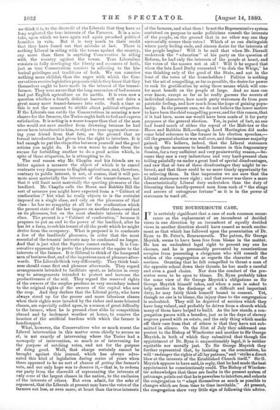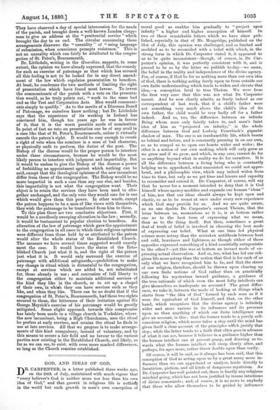THE BOURNEMOUTH CASE.
IT is certainly significant that a case of such common occur- rence as the replacement of an incumbent of decided views in one direction by an incumbent of equally decided views in another direction should have caused so much excite- merit as that which has followed upon the presentation of Dr. Ryan to St. Peter's, Bournemouth. The patron, Sir George Meyrick, seems to have been free from blame in the matter. He has an undoubted legal right to present any one he chooses, and he is presumably prevented by conscientious scruples from presenting a clergyman who will consult the wishes of the congregation as regards the character of the services. Granting that he felt compelled to thrust a man of the opposite school down their throats, he has made a careful and even a good choice. Nor does the conduct of the pre- sentee seem to be open to blame. Dr. Ryan probably takes the same view of Sir George Meyrick's obligations as Sir George Meyrick himself takes, and when a man is asked to help another in the discharge of a difficult and important duty, he may fairly think himself bound to consent. Yet, though no one is to blame, the injury done to the congregation is undoubted. They will be deprived of services which they have long valued, and probably be driven from a church which many of them have helped to build. As the law stands, a con- gregation passes with a benefice, just as in the days of slavery negroes passed with an estate, and the only thing which marks off their case from that of other; is that they have not sub- mitted in silence. On the 31st of July they addressed one protest to the Bishop of Winchester and another to Sir George Meyrick, in both of which they submitted that though the appointment of Dr. Ryan is unquestionably legal, it is neither equitable nor morally just. To Sir George Meyrick they further represented that, by insisting on the nomination, he will "endanger the rights of all lay patrons," and "strike a direct blow at the interests of the Established Church itself." Sir G. Meyrick appears to have said,in reply, that he had made the best appointment he conscientiously could. The Bishop of Winches- ter acknowledges that there are faults in the present system of patronage, points out that he is powerless to interfere, and exhorts the congregation to " adapt themselves as much as possible to changes which are from time to time inevitable." At present, the congregation show very little sign of following this advice.
They have observed a day of special intercession for the needs of the parish, and brought down a well-known London clergy- man to give an address at the "penitential service " which brought the day to an end. The circular announcing these arrangements disavows the " unreality " of " using language of submission, when conscience prompts resistance." This is not an unreality which can fairly be attributed to the congre- gation of St. Peter's, Bournemouth.
Dr. Littledale, writing in the Guardian, supports, to some extent, the opinion we have already expressed, that the remedy for such an exercise of patronage as that which has aroused all this feeling is not to be looked for in any direct amend- ment of the law which regulates presentation to benefices. At least, he condemns the two methods of limiting the right of presentation which have found most favour. To invest the communicants of the parish with a veto on the presenta- tion would, as he truly points out, " work to the same bad end as the Test and Corporation Acts. Men would communi- cate simply to qualify." As to the merits of a Diocesan Board of Patronage, we ourselves know nothing ; but Dr. Littledale says that the experience of its working in Ireland has convinced him, though ten years ago he was in favour of it, that it is the worst possible mode of nomination. In point of fact no veto on presentation can be of any avail in a'case like that of St. Peter's, Bournemouth, unless it virtually cancels the patron's right. .It would be easy enough to create a right of veto when the nominee is a man of bad character, or physically unfit to perform the duties of the post. The Bishop of the diocese would be the proper person to interfere under these circumstances, because he would be the most likely person to interfere with judgment and impartiality. But it would be useless to give the Bishop of the diocese a power of forbidding an appointment against which nothing can be said, except that the theological opinions of the new incumbent differ from those of the congregation. The Bishop would be no more impartial in such a case than any one else, and besides, this impartiality is not what the congregation want. Their object is to retain the services they have been used to alto- gether unchanged, and the only veto they would care for is one which would give them this power. In other words, except the patron happens to be a man of like views with themselves, they wish the patronage to be transferred from him to them.
To this plan there are two conclusive objections. First, it would be a needlessly sweeping alteration in the law ; secondly, it would.be tantamount to popular election to benefices. An alteration of the law of patronage which gave the appointment to the congregation in all cases in which their religious opinions were different from those held by or attributed to the patron would alter the whole status of the Established Church. The measure we have several times suggested would exactly meet the case. It would leave the status of the Esta- blished Church just what it is, and the right of the patron just what it is. It would only surround the exercise of patronage with additional safeguards,—prohibition to make any change in ritual which is distasteful to the congregation, except at services which are added to, not substituted for, those already in use ; and concession of full liberty to the congregation either to maintain additional services of the kind they like in the church, or to set up a chapel of their own, in whish they can have services such as they like; and when they like. There can be no doubt that if the congregation of St. Peter's, Bournemouth, had these two rights secured to them, the bitterness of their irritation against Sir George Meyrick's exercise of his patronage would be greatly mitigated. Some slight approach towards this compromise has lately been made in a village church in Yorkshire, where the new incumbent, being a High Churchman, uses the ritual he prefers at early services, and retains the ritual he finds in use at late services. All that we propose is to make arrange- ments of this kind compulsory, instead of voluntary, and by this means to secure a fair field and no favour to the various parties now existing in the Established Church, and likely, so far as we can see, to exist, with even more marked differences, so long as the Church remains established.































 Previous page
Previous page